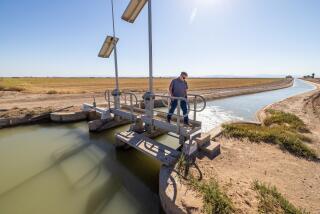Congress’ Hand on the Tap
A few years back, it was hard to get officials of Southern California’s four big city and farm water agencies into the same room. Today, they are united behind a plan to keep adequate water flowing from the Colorado River to Southern California. The plan’s fate is now up to Congress. If a federal bill intended to put the agencies’ hard-fought deal into law fails to pass, Southern California will stand to lose enough water to supply 1.5 million homes for a year.
The newly united agencies are the Metropolitan Water District of Southern California, which wholesales water throughout the region, the San Diego County Water Authority, the Imperial Irrigation District and the Coachella Valley Water District.
The background in a nutshell: Of the Colorado River’s annual average flow of 7.5 million acre-feet (each acre-foot would cover an acre to a depth of one foot), California is allocated 4.4 million, Arizona 2.8 million and Nevada 300,000. But California has long guzzled more than its share, taking 5.2 million acre-feet annually in recent years. Arizona and Nevada didn’t complain because they couldn’t use all of their water. Now they want their full shares. And the Upper Colorado River Basin states--Colorado, Wyoming, Utah and New Mexico--have long pressured California to stop using more than its allotment.
With a gun at their head, in effect, the California agencies worked out a plan for the state to live within its 4.4 million acre-feet. The deal has won the support of the U.S. Department of the Interior and the other Colorado River Basin states, but the bill, HR 2764, is necessary for it to go into effect.
California will cut back its use over 15 years, making up the loss with water trades from farming areas, by storing excess water in wet years and through conservation and other programs. The federal government has given California until the end of 2002 to put the plan into operation. If it fails, Southern California could lose 750,000 acre-feet of Colorado River water in 2003.
But some groups supporting restoration of the Salton Sea in Imperial and Riverside counties fear that the plan would reduce the runoff of irrigation water into the sea, making the nearly dead inland sea even saltier and sicker. A Salton Sea study, including examination of the effect of the water transfers, has not been completed, although Congress earlier declared that restoration of the Salton Sea should not depend on diversion of Colorado River water.
HR 2764, by Rep. Duncan Hunter (R-Alpine), would allow the California water plan to proceed, authorize the U.S. Fish and Wildlife Service to develop protection of threatened or endangered species in the area and appropriate $60 million for Salton Sea restoration. Passage of this legislation is the key to water peace in the Southwest for decades to come. It deserves and needs the full support of Congress and the Bush administration now.
More to Read
Sign up for Essential California
The most important California stories and recommendations in your inbox every morning.
You may occasionally receive promotional content from the Los Angeles Times.










